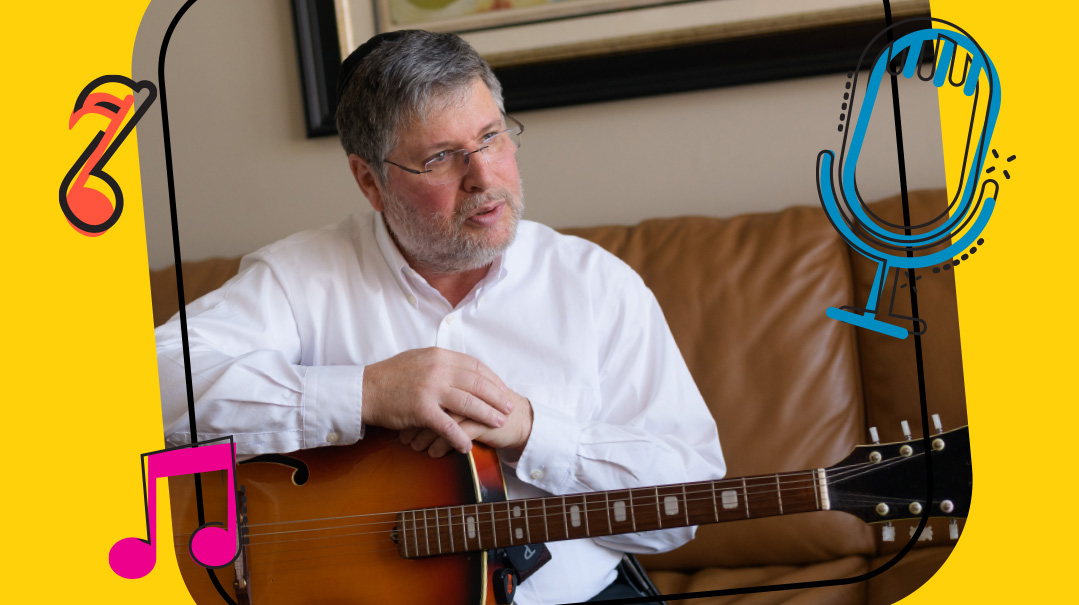Soundtrack of Our Childhood: Marvelous Middos Machine
| October 6, 2022The backstories of those favorite albums that still frame our memories

“Adults can get the message, too”
Marvelous Midos Machine
ABIE ROTENBERG shares the backstory
HOW THE ORIGINAL CONCEPT DEVELOPED
My oldest daughter Bella remembers that one day back in the early 1980s, when I was driving her and her friends to school, I mentioned that there was a need for a tape about middos. I don’t actually remember this at all, but apparently, we were listening to Uncle Moishy, and since the songs were mostly about mitzvos, it got me musing that there was room in the market for a tape about middos too, which are another important facet of our lives. Together with the kids in the carpool, we started to discuss which middos could be included.
I then sat down with Moshe Yess a”h, my partner for Volume I, and we wrote the story and the script. There are so many middos listed in Orchos Tzaddikim, so we knew that to do the subject justice, we needed many songs. Our idea was to create a story line that would be riveting, and then slowly, over a series of albums, cover the most important middos. We wanted each song to play in context of real situations children find themselves in, and we especially wanted them to reconsider their actions and do the right thing.
After the first album, The Marvelous Middos Machine 1 (Up, Up and Away) in 1984, Moshe Yess moved away from Toronto to Montreal, and I did the rest on my own. Back in the 1980s, Jewish music projects didn’t have the budgets they have today — there simply was very little money in the industry to hire people. If you came up with an idea and were producing it, you’d have to act and sing yourself. Marvelous Middos tapes were born on a shoestring budget: I was Shnooky, Moshe was Dr. Doomshtein, and Dr. Middos is the voice of Rabbi Shmuel Klein, a noted educator who also contributed ideas and songs to the series. Other talented friends from school and shul joined, and I gathered a small choir of boys from Yeshivas Eitz Chaim, the school I taught in at the time.
THE MOST MEMORABLE LINE
Dizzy’s “What’s my ketchup doing on the radio, Doc?”
There was a newscast in which it was announced that bottles of ketchup were discovered at the scene of the blast-off. Dr. Midos forgot to put them into the Midos satellite for Dizzy.
SURPRISES ALONG THE WAY
I am blown away by the number of adults who remember listening to Marvelous Midos Machine as children. In many cases they still remember each lyric in every song, as well as the dialogue, and phrases such as “Middos alert, middos alert,” “The plug!” and “Yeshivah Aish Sameach.”
THE BEST GUEST PERFORMANCE
Zale Newman appeared on Volume IV as Uncle Moishy. He came to pay a visit to his good friend, Dr. Midos.
MY MOST MEANINGFUL FEEDBACK
When I appear at a kumzitz, Marvelous Midos songs are often requested by adults. The “Teshuvah” song from Midos II — “Hashem is so kind, He’ll forgive you, each day you can have a new start...” and the “Ahavas Yisrael” song from Midos III are still popular. Nachum Segal from JM in the AM has told me that he always plays the “Teshuvah” song during the Yamim Noraim period because he finds it inspires both him and listeners to focus on the kindness of Hashem and the potential for a new start. Countless parents let me know that although they bought the tapes for their children, they absorbed the middos messages themselves.
A FUNNY STUDIO MOMENT
We were working in the studio for several days with a non-Jewish engineer in Toronto. He had to make a particularly difficult edit in the master tape, using a razor blade, and when he was successful, he cried out “baruch Hashem!”
IF I WERE DOING ANOTHER SONG TODAY
I think I would focus on the middah of simchah, being happy to be a Jew. It’s not easy to be a kid today. Parents are much more on top of their children than they were a generation back, and there’s lots of pressure. Yet we’re so lucky and fortunate to be who we are, and I would want kids to rejoice in it more.
WHAT I WISH I COULD CHANGE OR TAKE BACK
Honestly, there are always things that could have been done better, but once it’s out there, you can’t “unsend.” Whatever is released is etched in stone. And if there was a specific song I wished I could change, I wouldn’t highlight it by telling all you readers about it.
MY FAVORITE EPISODE
The very first scene, spilling the milk on the kitchen floor. Of course, this never actually happened to any of us.
(Originally featured in Mishpacha, Issue 931)
Oops! We could not locate your form.






